Titmus, McKeown Shatter Australian Golden Drought, Return Swimming-Proud Nation to Olympic Glory
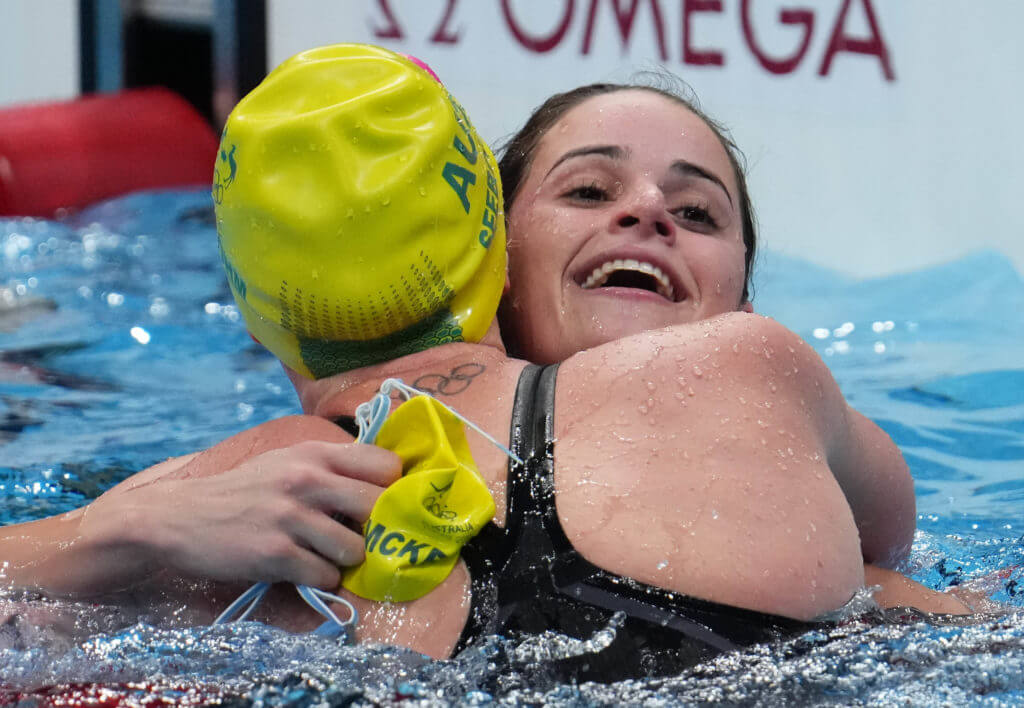
Editorial content for the 2021 Tokyo Olympic Games coverage is sponsored by GMX7.
See full event coverage. Follow GMX7 on Instagram at @GMX7training #gmx7

Titmus, McKeown Shatter Australian Golden Drought, Return Swimming-Proud Nation to Olympic Glory
The powers-that-be in Australian swimming swore that 2012 would never be repeated. Yet somehow, 2016 was arguably worse. Now, after two straight Olympics of incredible disappointment in the pool for the Dolphins from Down Under, Australia is finally back.
At the country’s Olympic Trials last month, Ariarne Titmus and Kaylee McKeown each opened eyes with startling performances, Titmus coming within tenths of vaunted world records in the 200 and 400 freestyle and McKeown taking down the world record in the women’s 100 backstroke while recording by far the world’s quickest times in the 200 backstroke and 200 IM. Suddenly, this duo placed massive targets on themselves and ensured that they would be expected to perform at the Tokyo Olympics, the exact same favorite status under which so many Australians shriveled in both London and Rio.
But Titmus and McKeown? They didn’t.
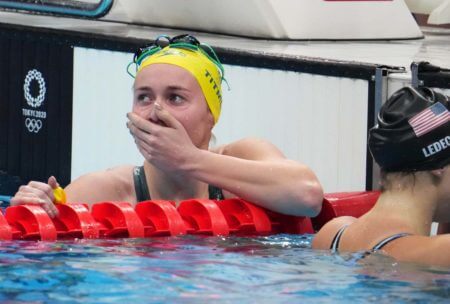
Ariarne Titmus in amazement after winning Olympic gold in the women’s 400 free — Photo Courtesy: Robert Hanashiro/USA Today Sports
Titmus went blow-for-blow in the 400 freestyle against a near-her-best Katie Ledecky and got the win. She not only matched her shocking 3:56 speed from Trials – she went two tenths faster. And then, in one of the Games’ most anticipated races, the women’s 100 back, McKeown would face off with her predecessor as world-record holder (Regan Smith) and the two-time world champion (Kylie Masse). McKeown got the job done, her victory coming by a comfortable quarter-second margin. Her win gave Australia its first-ever gold medal in women’s backstroke, the only stroke where the country had never previously reached the top of the Olympic podium.
The victory was an emotional one for McKeown, who lost her father Sholto to brain cancer last year. After the race, while speaking with Australia’s 7 News, McKeown was asked to deliver a message to mother Sharon and older sister Taylor, a 2016 Olympic finalist in her own right, and Kaylee delivered a profanity-laden response before she could catch herself, horrified. But excuse McKeown’s language. She and her country had a lot to be thrilled about.
Two Cycles of Sheer Disappointment
Looking back, the 2008 Olympics were the heyday of Australian women’s swimming, and that crew even left gold medals on the table in Beijing. Four Australian women won gold that meet, Stephanie Rice in the women’s 400 IM and 200 IM, Libby Trickett in the 100 fly and Leisel Jones in the 100 breast. The Aussie women won the 800 free relay, in an upset, and the 400 medley relay, in less of an upset. But Trickett entered the meet as world-record holder and world champion in the 50 free and 100 free, and Jones the same in the 200 breast. The Australians were also favored in the 400 free relay. They won none of those events.
But then consider what came next: In London, after an upset gold medal win in the women’s 400 free relay on day one, Australia ended up capturing just 10 total medals, tied for third among all countries in swimming, and the team failed to win another gold medal. The heavily-favored men’s 400 free relay failed to reach the podium at all, and its star, James Magnussen lost the 100 free gold medal to Nathan Adrian by one hundredth. Emily Seebohm, after setting an Olympic record in the 100 back prelims, swam almost a half-second slower in the final and came up short behind American Missy Franklin.
So how could 2016 have been even more of a disaster? Because that Australian team was projected to shine in Rio, possibly even rival the United States in the gold medal count. Consider this list of favorites for gold: Cate Campbell in the women’s 50 and 100 free, Seebohm in the women’s 100 back, Cameron McEvoy in the men’s 100 free and Mitch Larkin in the men’s 100 and 200 back. That’s four swimmers in six events, and they combined to win one medal, Larkin’s silver in the 100 back.
The Games started out so strong, with Mack Horton out-dueling Sun Yang for Olympic gold in the 400 free and the women defending their gold medal in the 400 free relay. But they would go on to win just one additional gold, when 19-year-old Kyle Chalmers stormed from out of nowhere for a stunning gold in the men’s 100 free. That same night, Maddie Groves swam a gutty 200 butterfly to earn silver, 0.03 behind gold medalist Mireia Belmonte, and Emma McKeon got a bronze in the 200 free.
But individually, that was it. And Australia’s final medal total was, once again, 10.
Atonement in Tokyo
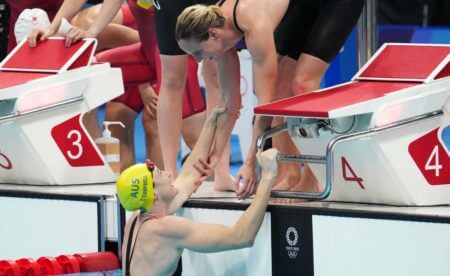
Cate Campbell and Australia celebrate Olympic gold in the women’s 400 free relay — Photo Courtesy: Robert Hanashiro — USA Today Sports
As the saying goes, “imitation is the sincerest form of flattery,” and after the Americans won 31 medals in London and 33 in Rio, the Australians wanted to imitate everything the Americans had done. That included moving selection meets for major championships from their usual spot in March or April to one month before the prime event, to ensure that no swimmer became complacent after qualifying and showed up to the international event in less than prime form.
So instead of this year’s Australian Trials taking place two or three months before the American version in Omaha, the two meets happened almost concurrently, and those in Omaha woke up each of the first several mornings to news of more scintillating swims from Down Under. But the question still loomed: would these Australians break the trend of major underperformance at the Olympics?
Indeed they would. The gold by Titmus was the first such individual honor for an Australian woman in 13 years, since Rice touched first in the 200 IM final on day four of the Beijing Games. So many women – Jones, Trickett, Seebohm and Campbell among them – had fallen short as favorites during that long stretch. But no more.
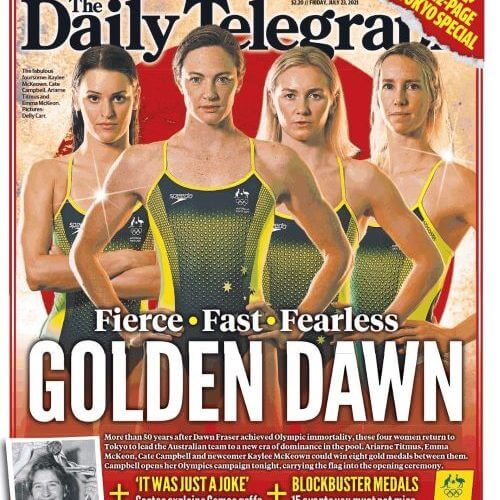
Photo Courtesy: Daily Telegraph
Through three days and 12 out of 35 Olympic finals, Australia has already matched its gold-medal total from Rio with three, and with seven medals already, the country could soon eclipse its medal total from each of the previous two Games with five more days of competition remaining. The Daily Telegraph suggested this type of production was on the way when it recently produced a cover featuring Campbell, McKeown, McKeon and Titmus.
Consider the upcoming chances: Titmus, for one, is a heavy favorite for gold in the 200 free final, she is likely to lead Australia to gold in the 800 free relay, and while a gold medal in the 800 free would be a tough ask given Ledecky’s abilities in that event, Titmus can definitely reach the podium there, too. McKeown will also be a heavy favorite to make it double gold, with her shot coming up in the 200 back, and she will be part of Australia’s women’s medley relay and possibly mixed medley relay, each a virtual lock for medals and a contender for gold. And McKeon, already a bronze medalist in the 100 fly, will be the favorite for gold in the 100 free, and she and Campbell could both reach the podium in both the 50 and 100 freestyle races.
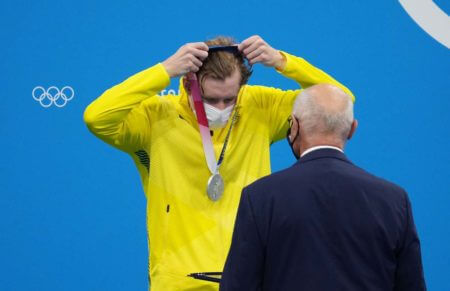
Jack McLoughlin earned silver in the men’s 400 free — Photo Courtesy: Robert Hanashiro/USA Today Sports
The Australian men have not reached the same level of excellence so far in Tokyo, particularly with world No. 1 Elijah Winnington fading to seventh in the 400 free, but Chalmers is on fire. He almost single-handedly willed Australia to bronze in the men’s 400 free relay with his 46.44 anchor split, and he will again provide a key leg in Wednesday’s 800 free relay. Caeleb Dressel is favored to win gold in the 100 free, but could Chalmers stun him and successfully defend his gold medal?
Beginning in Tuesday evening’s prelims, the Australians will unleash two studs in the men’s 200 breaststroke, No. 2 all-time performer Zac Stubblety-Cook and former co-world-record holder Matt Wilson. 400 free silver medalist Jack McLoughlin will fight for a medal in the 800 free, and so will Matt Temple in the 100 fly.
So after a long run of coming up small in the big moments, Australia has absolutely regained its spot as one of swimming’s premier nations.




